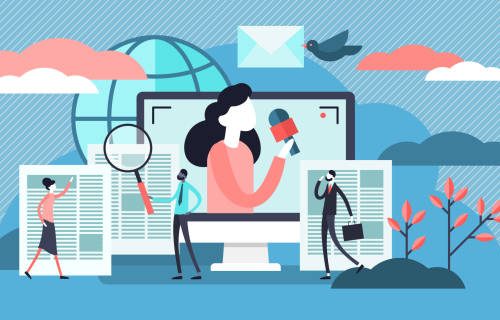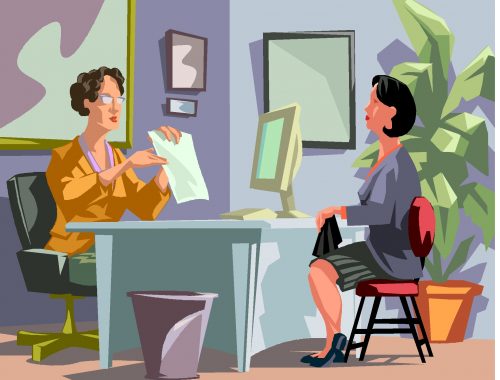‘The Interview’ behind the scenes.
Heart racing. Pulse rushing. Leg shaking.
This is how I’ve felt sitting outside every interview room I’ve ever been in. I always assumed I’d find interviews easy. Growing up in the arts I had ample experience auditioning in new, scary environments in front of brutally honest, intimidating panels of professionals. This never seemed to scare me. Interviews on the other hand have always provided a nightmare inducing, flight reaction deep inside. In all of those auditions I went to I got to play a role, become someone else. Being yourself is entirely harder and more terrifying.
In this post I will be reflecting on a simulated interview practice I participated in using Borton’s model of reflection[1] to assess how successful I was in my interview and how I could improve my interview skills for the future. The Borton reflective model consists of a ‘simplified approach to reflection- what? So what? Now what?’[2]. It requires an examination of actions, their effects and how these actions could be edited to get a different response in future.


[1] Borton, 1970
[2] Lucas, 2012
After the interview group had familiarised themselves with the job role I had chosen, a BBC assistant producer role, I was welcomed into the interview room. Each person took a turn to ask me a question regarding the job role and my prior experience. These questions covered my hobbies, past jobs as well as related film experience and my hopes for the future.
I was asked a series of questions requiring self-reflection on times I’d overcome challenges and worked well as part of a team. To answer these questions, I referred to on set experiences as a part of my degree, work experience I have obtained as well as part time work. I tried to highlight examples of occasions where I had demonstrated my ability to work quickly under pressure. When not using anecdotes directly related to on set filming experience, I aimed to highlight a range of transferable skills, namely, people skills and the ability to remain calm and adapt in challenging situations both of which are key to the role of an assistant producer on any set.
After completing the interview, I received feedback from the group. Next, I thought back to Borton’s model of reflection, considering what exactly I did and what I may do in future.

What?
Overall, I received positive feedback on my manner and the way I presented myself. During the interview I was conscious to smile, make direct eye contact and sit up straight to appear professional and confident. The group highlighted this affirming my approach to presentation. I did receive feedback that at times I spoke too fast making myself hard to follow.
So what?
Upon reflection this is definitely a habit I display when nervous. I considered if there was anything I could do differently to slow down the pace of my speech.
Now what?
In order to approach this differently in the future, I have considered using mindfulness techniques such as completing a breathing exercise prior to entering an interview situation. Perhaps taking some time before entering an interview to centre my thoughts will ensure I am feeling as relaxed as possible naturally slowing down the pace of my voice as well as my overall confidence.

What?
I was really pleased with was my ability to discuss the job role and tailor my answers to the qualities I knew the company would be looking for in a candidate. Prior to the interview, I read through the BBC’s career page as well as their mission statement.
So what?
I discovered that the BBC often values potential over past experience and is particularly looking for more diverse and disruptive voices within their producing team. I aimed to highlight my future goals and qualities I feel show my potential in my answers.
Now what?
The group’s feedback implied this was a particular strength in my ability to answer questions so researching the role on the company’s website and exploring the mission statement for the company I’m applying to, is definitely an approach that I plan to use in the future.

What?
During the interview the panel asked me what I felt my strengths and weaknesses are. I commented on my people skills and dedication and then said I feel I sometimes lack confidence when working independently and also mentioned my tendency to lack patience with intricate tasks. I felt uncomfortable ‘bragging’ and definitely showed some hesitation when providing strengths about myself. Conversely, I potentially was too quick to supply weaknesses to the interviewers.
So what?
Speaking with the panel afterwards they suggested I aim to be more positive when answering this question.
Now what?
Since this is a fairly standard interview question I plan to devise an answer to this providing two strengths and weakness to use in future interviews. In doing this my hope is to sound more assured when I speak about my personal qualities and provide a more positive and confident self-reflection.
I learned a great deal from this experience, not only interview techniques but also through my self-reflection I have discovered a couple of habits I do subconsciously that may highlight my nerves to an interviewer. Overall, the experience was far more enjoyable than I had predicted despite some real nerves present throughout the whole interview. Having some specific feedback has not only given me practical things I can work on but also highlighted the things I am doing successfully in the interview situation. Moving forward, I hope to enter that interview room with more confidence allowing my experience and personal qualities to speak for themselves.
References
Borton, T, Reach, Touch and Teach, 1970.
Lucas, P, Critical reflection. What do we really mean?, 2012 Australian Collaborative Education Network National Conference, 2012.
You May Also Like

Job Interviews: Selling Yourself For A Pay Cheque
24 February 2023
To Be Or Not To Be – That Is The Interview Question
23 February 2023
